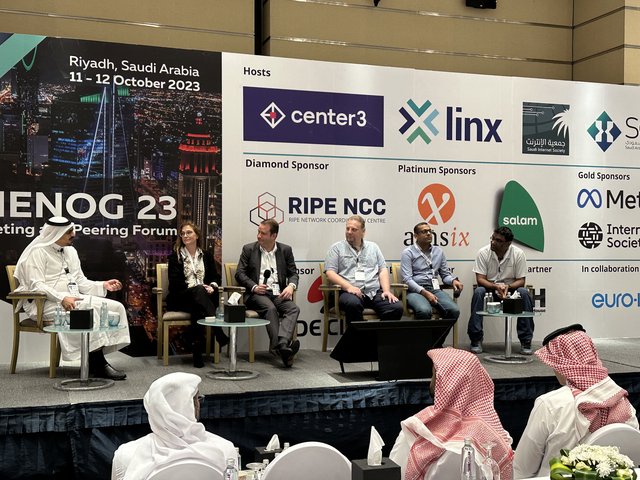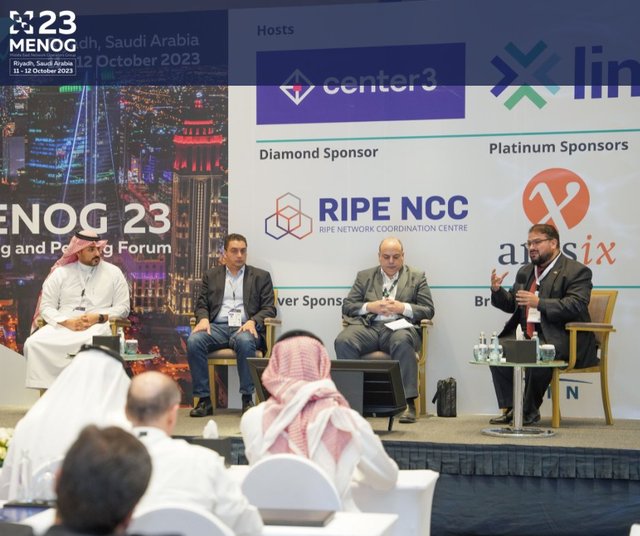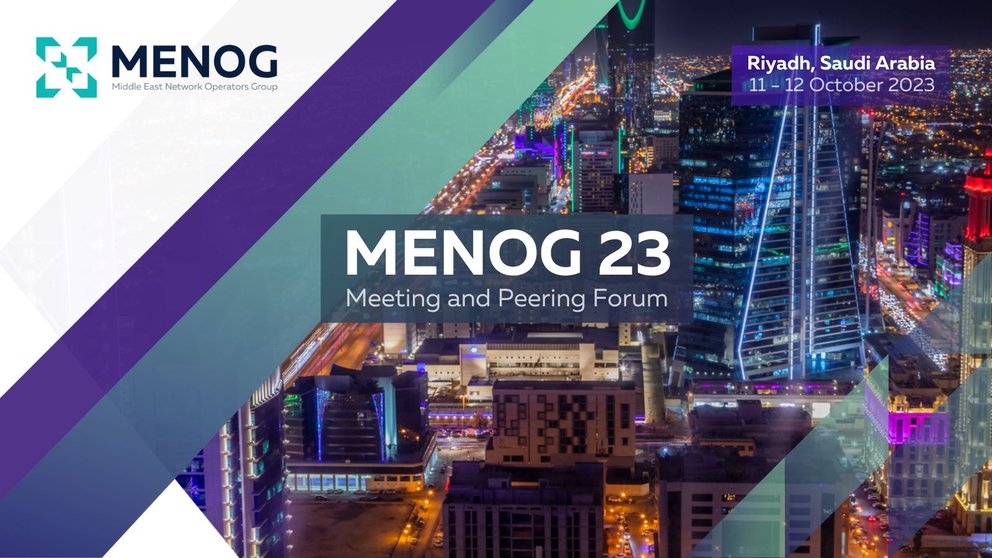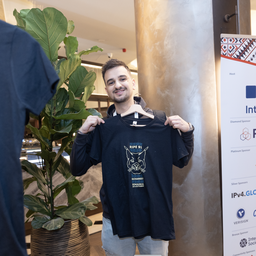The 23rd edition of the Middle East Network Operating Group (MENOG) was held in Riyadh, Saudi Arabia, as the country accelerates its efforts to become a connection hub for the region and develop its digital economy.
MENOG 23 took place from 10-12 October and saw 212 attendees from 25 countries. The event was officially kicked off by Eng. Bassam Albassam, MCIT Deputy Minister of Saudi Arabia, and Fahad Alhajeri, CEO (center3). They emphasised Saudi Arabia's commitment to becoming a global hub connecting Asia, Europe, and Africa and highlighted specific goals, including doubling FTTH coverage, enhancing computing power, and ensuring increased Internet resilience. Hisham Ibrahim, CCO for the RIPE NCC, provided an update on global connectivity, IPv6 development, routing security, and the changing landscape of Internet Exchange Points (IXPs) in the region.
Saudi Arabia’s recent achievements
Saudi Arabia has had a number of recent successes in improving its Internet infrastructure, leading to a peak traffic of 360 Gbps in 2023. This has been achieved through the establishment of six DNS root servers and a tenfold increase in national capacity, resulting in substantial savings of 30 million dollars in international connectivity costs. Salman Alomiri from the Saudi Arabia Internet Exchange (SAIX) talked about how SAIX has helped reshape the country's Internet ecosystem by enhancing performance through integration with various stakeholders.
RPKI was another topic highlighted throughout the event. Fahad Alduraibi (CST) showed in his presentation that ROA coverage in the country has grown rapidly over the past year, rising from 15% to 95% in the space of three months. Another success is the quick adoption of IPv6, ranking Saudi Arabia among the top 10 countries in terms of IPv6 adoption with 60% deployment. The Kingdom's IPv6 Adoption Journey, a talk presented by Musaab Alammar (CST), described the country's three-phase plan, focused on service providers, enterprises and end users, which has accelerated IPv6 deployment.
Local communities
The role of local communities in helping to build a stronger Internet was a central theme of the meeting and the subject of the first panel discussion. The panellists emphasised the importance of building trust, knowledge sharing, and creating a strong collaborative environment in order to help drive, for example, further adoption of IPv6 in the region. There is a strong need for inclusive participation and much of emphasis was placed on the value of both formal and informal gatherings in facilitating socialisation and sharing experiences and best practices.

NOGs are an essential part of this, and one takeaway from the session was that making it easier for engineers to participate in NOGs is a must. Small steps here can make a big difference, and there are lots of useful resources out there. NLNOG, for example, has a text on its website that engineers can copy and send to their managers, explaining all the benefits of taking part in an NOG.
Transformations and Contributions of IXPs in the Middle East
The second panel discussion zoomed in on the role of IXPs in enhancing the Internet ecosystem by facilitating local content delivery and fostering collaboration. Speakers explained the function of IXPs as "factories generating Internet bandwidth," thereby enabling better interconnectivity between countries. They highlighted how the proliferation of IXPs is helping to reduce costs and generate sufficient bandwidth for all users, referring to success stories in the US and Brazil.
The discussion also touched upon the challenges IXPs in the region face and the necessity of collaborating with local regulators to overcome hurdles. Some of the speakers stressed the importance of creating a regulatory framework that promotes openness, neutrality, and trust to facilitate the further development of IXPs. And there's still a need for infrastructure development and cost-effectiveness to encourage collaboration across countries.
An interesting point was raised regarding potential risks of over-investment when starting an IXP, particularly in the absence of sufficient market competition. This was echoed in a presentation from Bernd Spiess (DE-CIX), who also went on to note the prevalence of interconnection gaps in the region. Yemen is an example of this discrepancy, as it is still not connected to other countries. He also asked IXPs to add a looking glass and a RIPE Atlas probe to their network, as they are useful for obtaining more accurate statistics on the state of the Internet in the region.
Global Connectivity in Saudi Arabia and the Middle East Region
The third and last panel focused on connectivity in Saudi Arabia and the region. The panellists stressed the importance of open access, carrier neutrality, and investments in infrastructure as key factors in improving connectivity in the region. They also stressed out the need for infrastructure in remote areas to improve coverage and facilitate more competition.

The panel also pointed out the Red Sea cable as a potential single point of failure, with proposed solutions involving a Saudi crossing to enhance connectivity. The speakers also shared that regulators are pushing for more interconnection and open access. A pan-Arab network and common infrastructure would be beneficial to the region, but they are still out of reach because of the many challenges involved. Some of these challenges were outlined in Nada Alwadi's presentation on interconnectivity in the Arab Gulf States. She identified the cyber-centric governance (which puts cybersecurity first) of most states as one of the main obstacles to interconnectivity, favouring a national rather than a regional approach.
The role of the RIPE NCC in the region
Last but not least, the presentation by our colleagues Chafic Chaya and Jad El Cham on RIPE NCC's engagement strategy in the Middle East shed light on how the organisation is helping countries in the region. The RIPE NCC currently has a working relationship with all the countries in the MENOG region and is working with local authorities to help them strengthen their Internet infrastructure. This support often takes the form of meetings and personalised workshops to respond to the specific needs of each country. In Saudi Arabia, this help was instrumental in improving routing security and increasing IPv6 coverage.





Comments 0
The comments section is closed for articles published more than a year ago. If you'd like to inform us of any issues, please contact us.